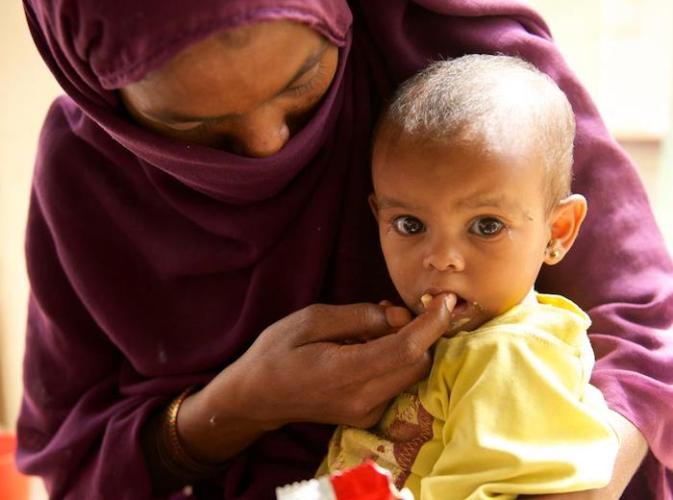UNICEF Sudan: ‘Four million children afflicted by acute malnutrition, 730,000 in severe condition’

A mother feeds her one-year-old daughter therapeutic food at a UNICEF-supported nutrition centre in Port Sudan (File photo: Noorani / UNICEF)
In an exclusive interview yesterday with Radio Dabanga, Mary Louise Eagleton, deputy representative of the United Nations International Children’s Emergency Fund (UNICEF) in Sudan, sheds light on the organisation’s efforts to confront the dire humanitarian circumstances currently impacting at least “four million children with acute malnutrition,” with “730,000 of them suffering from severe acute malnutrition” in the country.
Acknowledging the significant hurdles posed by access constraints, such as communication blackouts in certain regions, innovative approaches have been utilised to necessitate action, such as “phone assessments and social media monitoring to gather crucial information”, Eagleton states.
When asked about the urgency concerning the prevalence of severe acute malnutrition among children, the deputy representative stresses the importance of therapeutic food distribution, “particularly in high-risk regions such as Darfur, Kordofan, and Khartoum“.
Despite possessing a considerable stock of therapeutic food domestically, UNICEF faces logistical obstacles in reaching remote locales due to access limitations and conflict-related impediments.
The stark funding shortfall requires $840 million in 2024 to provide vital assistance, adding that the current funding levels stand at a mere seven per cent of what is needed to sustain aid efforts.
The US Agency for International Development (USAID) stands out as one of UNICEF’s “strongest funding pipelines”, alongside contributions from several other donors.
Eagleton further states that UNICEF collaborates with both national and international NGO partners across all 18 states of Sudan, facilitating aid distribution through partnership agreements, direct supply provision, and capacity-building initiatives.
“We closely monitor the activities of our partners on the ground through direct observation and third-party monitoring systems to ensure aid reaches those in need, especially children.”
WFP
As reported by Dabanga last week, the UN World Food Programme (WFP) has warned that the vast majority of Sudanese face severe hunger, with more than five million people unable to have one adequate meal per day.
During a press conference held in the Belgian capital, Brussels on February 21, WFP Sudan Director Eddie Rowe said that “five million people in Sudan cannot afford a square meal a day”.
At least 18 million people across Sudan face severe food insecurity, and “10 per cent of the population, close to five million people, are on the precipice of catastrophe”, the second-worst emergency classification used by the WFP before famine, Rowe told reporters.
WFP previously reported difficulties accessing people affected by the ongoing war. The UN food agency is reaching “only 10 per cent of those in need”, according to WFP East Africa Director Michael Dunford.
Rowe told reporters earlier this month that “WFP has food in Sudan, but lack of humanitarian access and other unnecessary hurdles are slowing operations and preventing us from getting vital aid to the people who most urgently need our support”.











 and then
and then